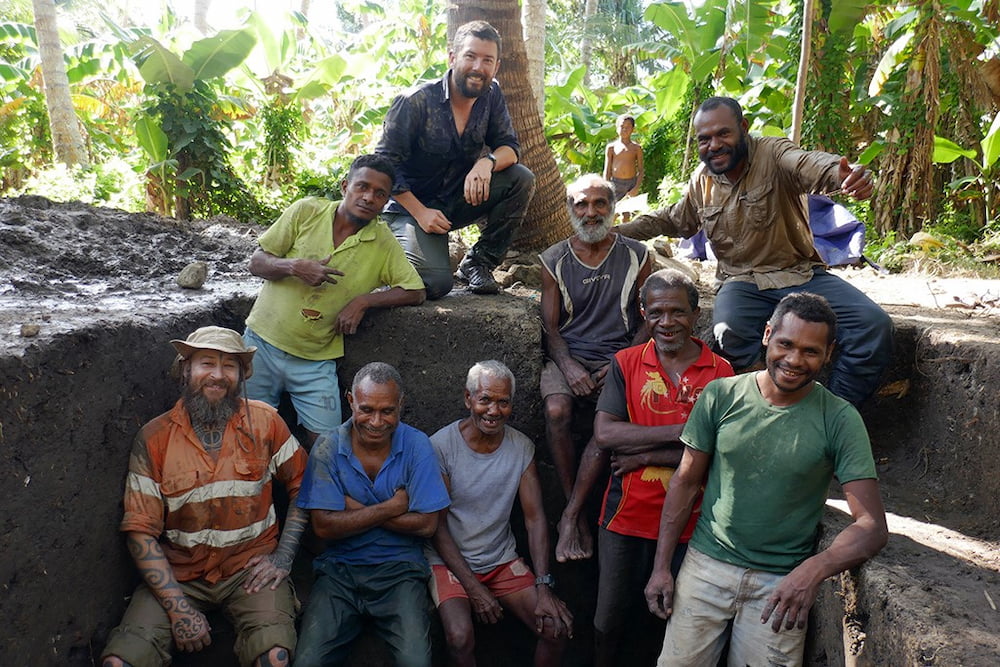The discovery of pottery from the ancient Lapita culture by researchers at The Australian National University (ANU) has shed new light on how Papua New Guinea (PNG) served as a launching pad for the colonisation of the Pacific – one of the greatest migrations in human history.
The new study makes clear the initial expansion of the Lapita people throughout PNG was far greater than previously thought.
The study, published in the Nature Ecology and Evolution journal, is based on the discovery of a distinctive Lapita pottery sherd, a broken piece of pottery with sharp edges, on Brooker Island (200km east of mainland PNG) in 2017.
Lead researcher Dr Ben Shaw said the discovery was “like finding the proverbial needle in a haystack”.
“Lapita cultural groups were the first people to reach the remote Pacific islands such as Vanuatu around 3,000 years ago. But in Papua New Guinea where people have lived for at least 50,000 years, the timing and extent of Lapita dispersals are poorly understood,” Dr Shaw said.
“For a long time, it was thought Lapita groups avoided most of Papua New Guinea because people were already living there.”
The study shows Lapita people introduced pottery to Papua New Guinea that had distinct markings, as well as new tool technologies and animals such as pigs.
“We found lots of Lapita pottery, a range of stone tools and evidence for shaping of obsidian [volcanic glass] into sharp blades,” Dr Shaw said.
“As we dug deeper, we reached an even earlier cultural layer before the introduction of pottery. What amazed us was the amount of mammal bone we recovered, some of which could be positively identified as pig and dog. These animals were introduced to New Guinea by Lapita and were associated with the use of turtle shell to make tools.”
Dr Shaw said the new discovery explains why the Lapita people colonised the Pacific islands 3,000 years ago and the role Indigenous populations had in Lapita decisions to look for new islands to live on.
According to Dr Shaw, later Lapita dispersals through PNG and interaction with Indigenous populations profoundly influenced the region as a global centre of cultural and linguistic diversity.
“It is one of the greatest migrations in human history and finally we have evidence to help explain why the migration might have occurred and why it took place when it did,” he said.
“We had no indication this would be a site of significance, and a lot of the time we were flying blind with the areas we surveyed and when looking for archaeological sites, so it is very much like finding the proverbial needle in a haystack.”
The research involved many ANU researchers and international collaborators who showed how migration pathways and island-hopping strategies culminated in rapid and purposeful Pacific-wide settlement.
“A lot of our good fortune was because of the cultural knowledge, and we built a strong relationship with the locals based on honesty and transparency about our research on their traditional lands. Without their express permission, this kind of work would simply not be possible. The Brooker community is listed as the senior author on the paper to acknowledge their fundamental role in this research,” Dr Shaw said.
The results of the research have been published in the Nature Ecology and Evolution journal. A video on Dr Shaw’s YouTube page also documents the archaeological excavations on Brooker Island, plus fieldwork in other parts of Papua New Guinea.
Get all the latest Canberra news, sport, entertainment, lifestyle, competitions and more delivered straight to your inbox with the Canberra Daily Daily Newsletter. Sign up here.



